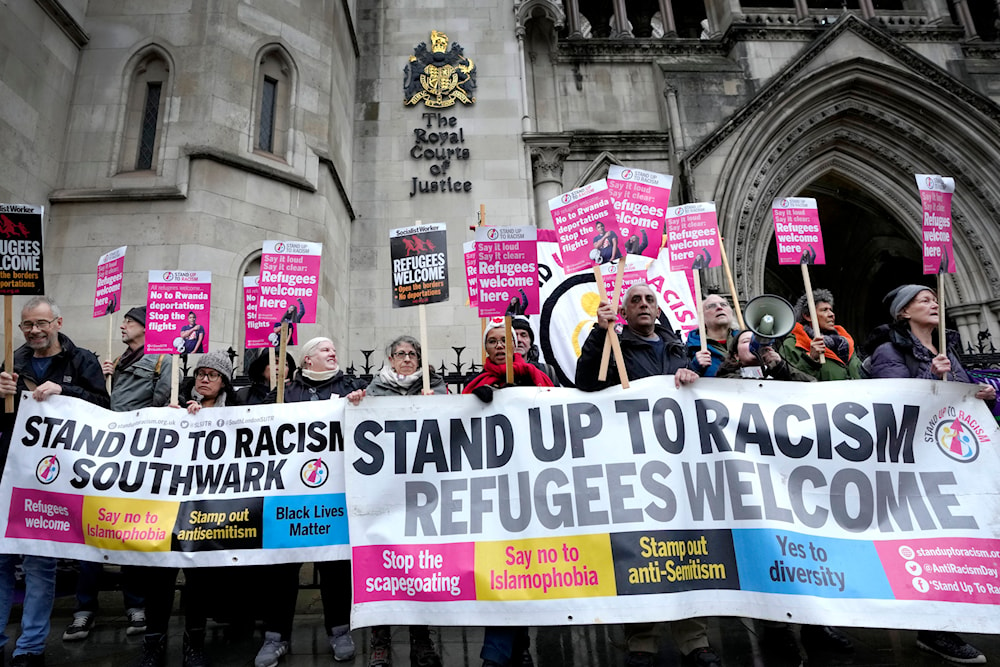UK's growing Sinophobia pushes restrictions on academic institutions
UK universities planning on pursuing funding partnerships and collaborations with foreign institutions will reportedly be obliged to consult with security services.
-

Stand Up To Racism campaigners hold banners outside the High Court in London, Monday, December 19, 2022. (AP)
According to The Times, Britain's national security services will vet academics and researchers at British universities as the UK cracks down on alleged Chinese espionage.
The measures were revealed following a meeting on April 25 between MI5 Director-General Ken McCallum and the vice-chancellors of two dozen leading universities, including Oxford and Cambridge, these measures were revealed.
Amid increasing Sinophobia in the UK, MI5's Director-General warned that so-called hostile states are actively using universities to steal technology that can "deliver their authoritarian, military, and commercial priorities."
McCallum accused China as one of the countries that are deploying both "overt and covert mechanisms" to "acquire intellectual property and steal advantage," based on what he claimed was a secret review into the vulnerabilities of the UK's higher education sector.
So, according to the report, consultations are in order on a new system of government as security services will conduct background checks on academics who have access to sensitive research.
Not only that, but the country's government will also increase security around sensitive sites by investigating new funding for higher education institutions.
UK universities planning on pursuing funding partnerships and collaborations with foreign institutions will reportedly be obliged to consult with security services.
UK continues to point fingers at China
The Chairwoman of the Foreign Affairs Select Committee, Alicia Kearns, said on X on Friday that academia has for "too long" pretended it has "no role to play in our national security" and could operate "free from geo-strategic realities."
For too long Academia has pretended it has no role to play in our national security and can operate free from geo-strategic realities - this is an outdated mindset making us vulnerable to hostile states.
— Alicia Kearns MP (@aliciakearns) April 26, 2024
I hope with this very welcome move we can better protect one of our… pic.twitter.com/sTjYaqZDA1
Even though China has repeatedly denied such claims, labeling them as "malicious smears", she further accused the country by claiming "Significant evidence indicates a systematic attempt by the Chinese Communist Party to infiltrate British academia and exfiltrate critical research, capabilities and technologies."
In this week's news briefing, Foreign Ministry spokesperson Wang Wenbin stressed, "We would like to reiterate that the claim that China could be stealing UK intelligence is a groundless accusation and malicious smear, and we firmly oppose that accusation. Such malicious manipulation aimed at China should stop."
Protests in the UK against Sinophobia
As part of an event called "Stand Up to Racism", thousands of people across the UK marched in groups urging an end to racist violence and extremism in all its forms across the country on March 17.
The Society for Anglo-Chinese Understanding, or SACU, was one of the groups participating in these protests.
Iris Yau from SACU told CGTN Europe, that Sinophobia, or anti-Chinese sentiment, has been constantly increasing in the UK, especially since the Covid-19 pandemic.
"People suddenly [think] they have the right that they can just abuse people verbally on public transportation," she stressed.
"Especially when you're on your own – then you get physical attacks. And it's not just in poor areas it's happening everywhere," Iris added.
Another Chinese woman who is studying in the UK, Fiona Sim, said that she faces racial abuse at university.
Speaking with CGTN, she said, "I was essentially blocked from taking part in my university's political life and getting involved in groups or cultural societies."
"It was all because I stood up for myself as a Chinese person," she emphasized.
Ongoing Sinophobia
Previously, the UK restricted Chinese technology imports due to perceived security risks. The government barred Huawei from the UK's 5G network in 2020, ordering the removal of all of the company's equipment and services by the end of December 2023.
In 2022, the heads of the domestic intelligence services in the United Kingdom and the United States accused China of economic espionage. Beijing denied the allegations, claiming that British intelligence was "simply projecting their own dishonorable behavior onto China."
Other Western states have also been practicing Sinophobia. Last year, Germany's education minister called for a review of student exchange policies with China on July 29, citing an alleged increased risk of scientific espionage presented by Chinese students receiving full state scholarships in Germany.
"China is becoming more and more competitive and is a systemic rival in the domain of science and research," Bettina Stark-Watzinger said in an interview published on August 5, 2023, by the Mediengruppe Bayern.

 4 Min Read
4 Min Read








